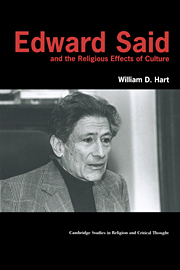Book contents
- Frontmatter
- Contents
- Preface
- Abbreviations
- Preliminary remarks
- 1 Culture as the transfiguration of religious thought
- 2 The religious effects of culture: nationalism
- 3 The religious effects of culture: Orientalism
- 4 The religious effects of culture: imperialism
- 5 The responsibilities of the secular critic
- 6 Marx, Said, and the Jewish question
- Concluding remarks: religion, secularism, and pragmatic naturalism
- Appendix A Whose exodus, which interpretation?
- Appendix B An exchange of letters between Michael Walzer and Edward Said
- Notes
- Select bibliography
- Index of names
Preface
Published online by Cambridge University Press: 22 September 2009
- Frontmatter
- Contents
- Preface
- Abbreviations
- Preliminary remarks
- 1 Culture as the transfiguration of religious thought
- 2 The religious effects of culture: nationalism
- 3 The religious effects of culture: Orientalism
- 4 The religious effects of culture: imperialism
- 5 The responsibilities of the secular critic
- 6 Marx, Said, and the Jewish question
- Concluding remarks: religion, secularism, and pragmatic naturalism
- Appendix A Whose exodus, which interpretation?
- Appendix B An exchange of letters between Michael Walzer and Edward Said
- Notes
- Select bibliography
- Index of names
Summary
Edward W. Said is a celebrated cultural critic and Palestinian activist. He is arguably the most influential American critic of the last quarter century. This book arose from my surprise and bafflement at Said's cryptic, fugitive, but persistent reference to the sacred, religious, theological, and Manichaean. Why these religious references by a self-described secular critic, a thinker whose work, on first glance, seems indifferent if not irrelevant to religious matters? I contend that the presence of these references and others signals the persistence of religion as a Western conceptual category. As with Marx, Nietzsche, and Heidegger before him, religion is the great conceptual dragon that Said must slay. I explore the degree to which religion is as important to Said's critique of culture and imperialism as it is to Marx's critique of capital, Nietzsche's critique of decadence, and Heidegger's critique of metaphysics.
Said is a man of many parts. I highlight some of those parts and leave others in the dark. I give much attention to his Marxism and comparatively little attention to his role as a literary critic. He does not describe himself as a Marxist, but Marxist ideas deeply influence his thinking. As I interpret him, Said reinstates Marx's claim that “the premise of all criticism is the criticism of religion.” Radical criticism, therefore, has a necessary relation to religion, not an accidental one. I know of no other contemporary social critic who is more insistent on this point.
- Type
- Chapter
- Information
- Edward Said and the Religious Effects of Culture , pp. ix - xiiPublisher: Cambridge University PressPrint publication year: 2000
- 1
- Cited by

